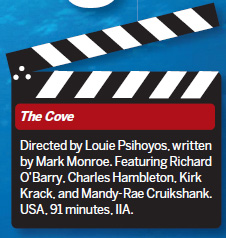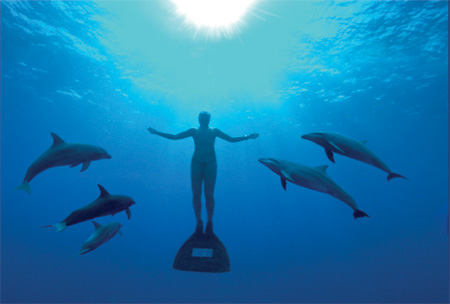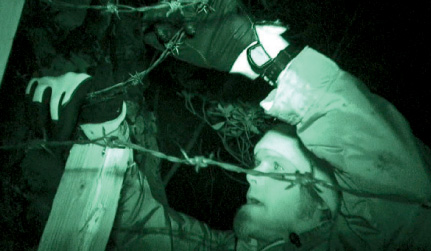More than just saving the whales
Updated: 2010-11-27 07:04
By Elizabeth Kerr(HK Edition)
|
|||||||||
|
Free diver Mandy-Rae Cruikshank swimming with the victims of mass slaughter in The Cove, a documentary that's not just about saving the whales. |

Dolphin slaughter doc finally hits screens in Hong Kong. Elizabeth Kerr reports.
Documentaries are the poor cousins of the movie world, often left to languish alone in the basement, because they're troublemakers. Very few docs are more than personal, independent labors of love on the part of filmmakers, to see them finished. Without specialized venues like the Yamagata, Hot Docs, Amsterdam and Sheffield film festivals there would be few outlets for seeing most of them as, unlike cable or network television news magazines, feature docs don't need to be "fair and balanced" in all cases. The majority of documentary filmmakers have something to say and have no qualms about making a statement and they have no real obligations to give everyone a voice. Don't like what's being said? Make your own doc from the other side of the argument.
But there's been a tiny renaissance in doc filmmaking lately, and there are certainly "star" directors within the format: Frederick Wiseman (High School), Michael Moore, Barbara Kopple (Harlan County, USA), Michael Apted (the Up series), Oscar-winner Alex Gibney (Taxi to the Darkside, Enron: The Smartest Guys in the Room), Charles Ferguson (No End in Sight, the upcoming 2008 banking meltdown doc Inside Job), Robert Greenwald (Wal-Mart: The High Cost of Low Price) and Allan King (Warrendale) among them. Errol Morris' The Thin Blue Line can be credited with kick-starting the current revitalization of the form in 1988. When Luc Jacquet's March of the Penguins, a bit of counter-programming to standard summer fare, turned into a box office hit in 2005, even the big studios were keen on getting into the doc game. Cash and prestige? Bring it.
The all time box office winner in the doc category is Moore's Fahrenheit 9/11 ($120 million), followed by Penguins ($78 million), but on average docs earn just about $1 million each - globally. Given the level of the stakes that film industries gamble at, cash isn't a very compelling reason to keep distributing them. 2009's five feature doc Oscar nominees - one of the Academy's few true prestige categories - combined for a total of $6 million in international box office. One of those was Food Inc., essential viewing for anyone that eats on a regular basis and one (Which Way Home, about migrant child workers) remains unreleased.
So the bigger picture hinges on whether or not documentary films have any real impact. If the argument holds that violent media makes teenagers kill people, then activist media should make activists of its viewers. That was the idea behind former eBay wizard Jeff Skoll's Participant Media, founded to actively produce films, including docs, with a purpose. One of Participant's first successes was Davis Guggenheim's Oscar-winning An Inconvenient Truth and we all know what kind of response that engendered. Their latest film, Waiting for Superman, has already, allegedly, inspired average citizens - with and without children - to do something about America's troubled public schools. Wiseman's Titicut Follies, about a hospital for the criminally insane, and Warrendale, about a home for emotionally disturbed children, both had notable influences on public opinion when there were released in the 1960s. Morris' Line resulted in the wrong man's death sentence for murder being overturned. McDonald's disclosing its nutritional information and canceling its Super Size option quickly followed Morgan Spurlock's Super Size Me. And the impact of Leni Riefenstahl's notorious 1935 quasi-doc Triumph of the Will has been well documented in hundreds of history texts.
The film that eventually took home the 2009 Oscar was The Cove. Right now it's best known for having the quickest cut-away ever for a winner's speech when "star" Ric O'Barry hoisted a sign above his head urging viewers to "Text DOLPHIN to 44144" as a protest. The film is focused on the efforts of former dolphin trainer O'Barry to stop the slaughter of thousands of dolphins each year in the tiny fishing hamlet of Taiji, Japan. O'Barry enlists the aid of National Geographic photographer-director Louie Psihoyos, two Canadian free divers and a Hollywood special effects team to reveal this ultra-secretive practice to the world. Let the cloak and dagger games begin.
The Cove is constructed like a thriller, and it does indeed possess a number of truly white-knuckle sequences and some hilariously prime time-ready villains (look out for Private Space and Japan's rep at the International Whaling Commission). The narrative is built by telling some of O'Barry's story, his years working on the TV series, Flipper, that would eventually kick off the dolphin and entertainment craze, his reform and a possible conspiracy at the heart of the Japanese dolphin hunt stemming from the country's "buying" of smaller member states within the IWC (dolphins are small cetaceans, or whales). As author Eric Schlosser alleged in Fast Food Nation in relation to beef, the dolphin hunt also involves the fundamentals of the Japanese fish supply and school lunch programs that could be compromised by mercury-tainted meat. We also get to know dolphins as characters, as the story's "victims," which adds a considerable amount of emotional heft when the slaughter is finally captured in living, digital color.
Is the film making a difference? Hard to say. The Cove has been slammed by the Japanese fisheries ministry and various groups who live in Taiji claiming the filmmakers were deceptive in their dealings and that much of O'Barry's paranoia is just that. The Japan Times reported that the mercury tests done in the film were inaccurate, however Japanese media covered the story for the first time ever. Screenings of The Cove in Japan have made news themselves. But the controversy around the film's production does little to reduce the impact of the film as a whole: there's no denying the power of the final images of the cove stained vibrant red with dolphin blood (another trick of the movie trade according to some). It's well known that dolphins are smart, and so watching one struggle in the water after being repeatedly stabbed is gut wrenching. Despite all that, the hunt resumed last September. The Cove is likely to have the most influence when and if consumers - particularly at home in Japan - actually take "Dolphin Safe" labels to heart. I know I do.
The Cove opened in Hong Kong on Thursday.
|
Director Louie Psihoyos (center) inspects the "rocks" the crew is going to use to gather hidden camera footage of Taiji's dolphin slaughter in The Cove. |
|
Movie effects wizard Charles Hambleton gets into the cloak-and-dagger action in The Cove, the Oscar winner about systematic dolphin slaughter off the coast of Japan. |
(HK Edition 11/27/2010 page4)


